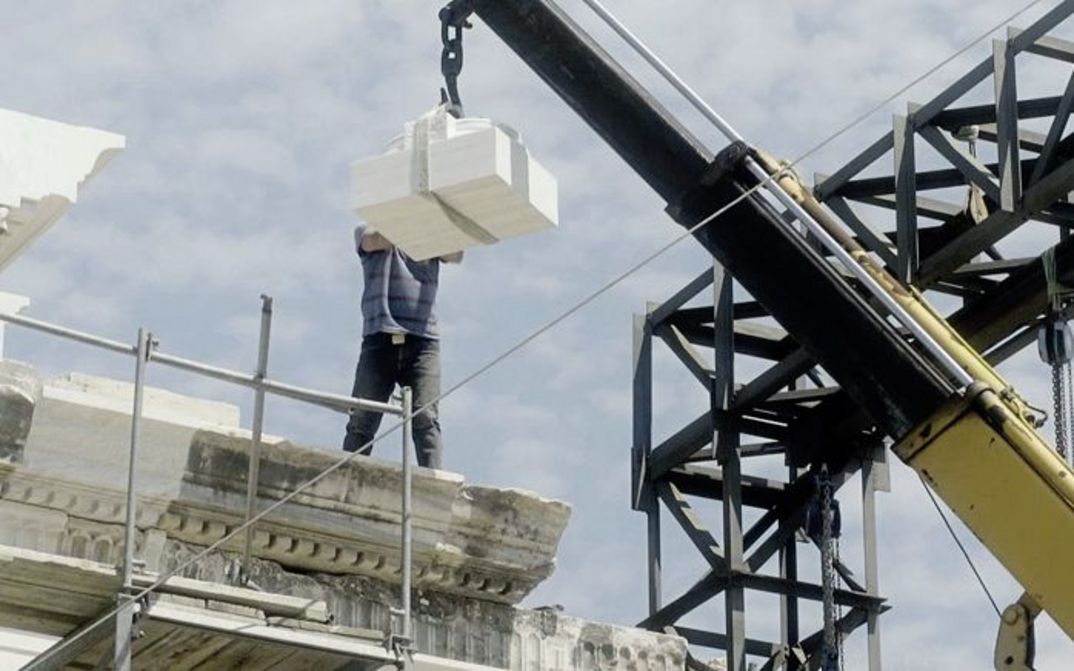Fiktionsbescheinung Program 4

Sat 25.02.
10:00
Cinema
Akademie der Künste
The „Fiktionsbescheinigung“ explores the question of how culture in general and cinema in particular are related to society and racism. It is dedicated to the work of Black directors and directors of colour in Germany and sees itself as an experiment in shared curatorial responsibility that also seeks to shine a spotlight on a chapter of German film production that has been unfairly neglected.
The film selection was put together by curators Karina Griffith, Jacqueline Nsiah and Can Sungu, supported by Enoka Ayemba and Biene Pilavci and the Berlinale Forum selection committee.
Director
Eren Aksu
Germany, Turkey / 2020
14 min.
/ Original version with English subtitles
Original language
German, Turkish
Asli is new in Berlin and works as a voiceover artist. After she records the Turkish version of the Pergamon Museum’s audio guide, the camera gazes at the famous altar, lingers on the fragment of a raised arm, on a bearded face without a nose, on a curly head of hair, on a ruffled dress of stone. The aspect ratio is smaller; the rest of the screen is black. “The friezes,” Asli says in voiceover, “represent the battle of the gods against the Titans.”
In his short film ONUN HARICINDE, IYIYIM, Eren Aksu evokes a recent transnational movement and an older one: that of immigrants from Turkey coming to Berlin in the late 2010s and that of the friezes that were excavated in Pergamon and brought to Germany in the 19th century. Loss is unavoidable: the fact that Asli speaks Turkish more fluently than a colleague who has been in Berlin since she was born puts the newcomer at an advantage and the local at a disadvantage. The Hercules fragments are missing from the friezes, and in the temple complex, which the film wanders through in generous, luminous wide shots in its final moments, the pieces later added to replace them stand out in gleaming bright white. (Cristina Nord)
Director
Yüksel Yavuz
Germany / 1995
52 min.
/ 16 mm
/ Original version with English subtitles
Original language
German, Turkish
Yüksel Yavuz is 15 years old when his father takes him to Germany with him after a summer spent in the Kurdish highlands. His father first took this journey in 1968: going from his life as a shepherd to work as a welder at a Hamburg dockyard. The physical and emotional distance between life in the “Little Istanbul” of the dockyard workers’ estate and village life in Turkey leaves its mark on the family. The mother stays behind in the home country, and the absentee father becomes an annual special guest, returning with suitcases full of gifts during summer. Until he cannot take it anymore and returns to Turkey. The journey between Hamburg and the Kurdish village is still made quite a few times, whether by the parents visiting their grandchildren in Germany or by the son visiting his parents at home with a film crew in tow. His father wanted to leave his mark, Yavuz says. Yet he did not heed the advice his father gave him after their arrival in Germany, choosing not to follow in his footsteps to become a worker, but rather remaining in Hamburg to study film. And thus his father does indeed leave his mark, in a way that won’t quickly fade, in this empathetic and personal documentary. (Anna Hoffmann)